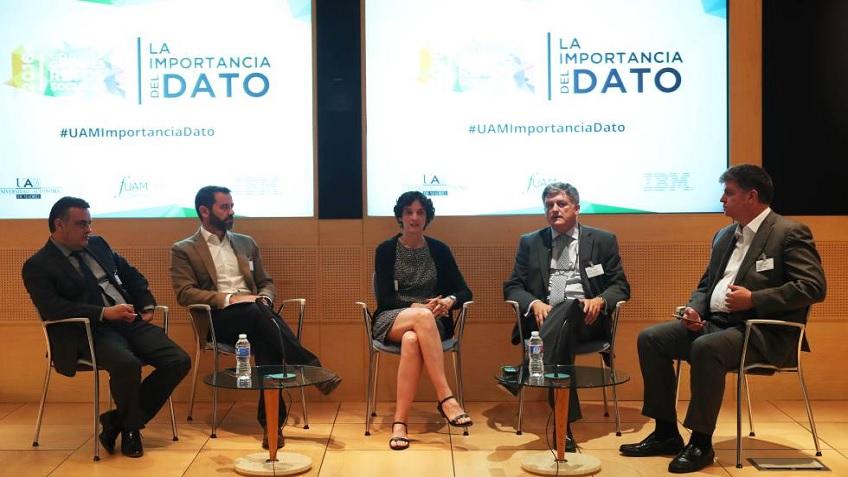News
25th anniversary of the FUAM: the importance of data
20-09-2016

The digital revolution has transformed society and has led to the emergence of the concept of Big Data. Everything we do online leaves a trail and this trail provides a vast amount of information that can help predict the behavior of people. There is a huge potential here for both businesses and consumers because it enables offers to be adapted to the needs of each client. But this phenomenon also raises questions for society. In an effort to address these new challenges of the digital environment and to mark the 25th anniversary of the Autonomous University of Madrid Foundation (FUAM), the UAM, Grupo PRISA and the IBM Foundation have held, this Thursday at the IBM Client Center in Madrid, the first of six events focussed on debating the major social challenges ahead.
The centerpiece of the event was a panel discussion chaired by Sonia Casado, Chief Data and Analytics Officer of Grupo PRISA, and featuring a range of figures associated with the UAM who work daily with data. Casado opened the debate by noting the importance of data, its potential benefits and how it can help improve services by creating an offer based on the study of consumer behavior. "We are all generating data that can be of value," said Casado. "Everything we do is traceable and with the trail that is created, one can acquire information," added Javier Ortega, director of the Polytechnic School of the UAM.
All participants agreed that vast amounts of data are currently being generated – data that will have a huge impact on all sectors. For example, hospitals accumulate huge amounts of reports and documentation. "The problem is what to do with all that data," said Julian Perez, deputy director of the Lawrence R.Klein-UAM Institute of Economic Forecasting (Instituto de Predicción Económica). "It is crucial that behind the data, there is a person who thinks in order to extract any value the data might harbor," he added. Alberto Barrientos, director of the UAM Institute of Knowledge Engineering, agreed: "It is important to know how to work with data, and not only that, we also need to know what kind of answers we're looking for," he said.
Rafael de Arce, professor of Applied Economics at the UAM, held the most critical position on Big Data, stressing the importance of capturing data within the analysis process. "The quality of the raw material determines everything else," argued de Arce. According to the economist, it is crucial that we develop methods of capturing good, reliable data because if the data is bad, everything we do with it will also be bad.
After two hours of discussion, one of the conclusions of the debate was that the chief challenge is what to do with so much information being generated right now and everywhere. "Data is a new raw material and we must exploit it as such," said Lucia Alvarez, director of IBM Analytics Spain. "Now we can solve old problems by thinking in new ways," she added.
The practical application of Big Data is of fundamental importance in companies where the study of consumer behavior helps predict their future behavior, but the commercial sector is not the only area where the study of data is important. "It is true that there are effects of Big Data that may seem rather negative," said Estrella Pulido, director of the IBM-UAM chair of studies. But, according to Pulido, the potential of Big Data is not limited to advertising so that a company can sell more. For example, one field where the study of data can be extremely useful is health. "That a cancer patient can be given a specific treatment based on their genetic characteristics is a huge benefit because such treatment will have a greater effect than a generic treatment that might be applied to any other patient," he added.
According to its proponents, there are a wide range of applications of Big Data that will bring many benefits to the general public, especially in the home. "Users will benefit greatly from solutions offered by companies using Big data," said Barrientos. Although the expert recognized that these solutions have not yet reached most homes, he was sure that it is merely a question of time. "It's a world that's coming and when it does, we will no longer be able to live without it," concluded Barrientos.
It may interest you



